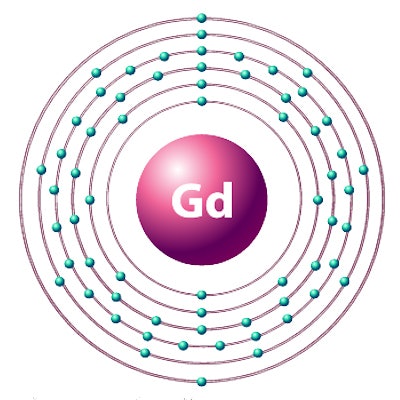
Even though the occurrence of nephrogenic systemic fibrosis (NSF) after exposure to gadolinium-based contrast agents (GBCAs) in patients with impaired kidney function is rare, clinicians should be cautious when using these agents in this population, according to a study published June 22 in the Annals of Internal Medicine.
 Dr. Joseph Lunyera of Duke University School of Medicine.
Dr. Joseph Lunyera of Duke University School of Medicine.The results address a knowledge gap regarding NSF and the newer GBCAs in patients with impaired kidney function, lead author Dr. Joseph Lunyera of Duke University School of Medicine in Durham, NC, told AuntMinnie.com via email.
"We specifically sought a nuanced evidence base on NSF risk across the spectrum of kidney function," he said. "These objectives were important because, prior to our study, there were evidence gaps regarding the relative safety of newer compared with older gadolinium-based contrast agents. There were also evidence gaps for NSF risk within certain subpopulations of patients, such as those with acute kidney injury or key risk factors for chronic kidney disease."
Debilitating disease
NSF is a debilitating, often fatal disease that has been associated with patient exposure to GBCAs used for MRI or MR angiography exams, the team noted. More than a decade ago, the U.S. Food and Drug Administration (FDA) warned that the use of gadolinium contrast boosted patients' risk of NSF; since then, newer gadolinium agents have been developed that are considered to be less risky, but their safety in populations of patients with acute kidney injury and those at risk for chronic kidney disease (CKD) has not been established.
Risk of NSF appears to be linked to the stability between the gadolinium and its chelate ligand and the patient's degree of kidney impairment, Lunyera and colleagues noted. Newer GBCAs are more stable in their gadolinium-ligand bond compared with older ones, and they are considered to carry lower risk of NSF.
"Kidney impairment is an additional risk factor for NSF, probably because of the kidney's role in clearing most GBCAs, and almost all cases of NSF have occurred in patients with advanced kidney disease," the team wrote. "However, uncertainties remain about the relative safety of newer GBCAs compared with older agents, and the degree and chronicity of kidney dysfunction that portends NSF risk."
To investigate NSF risk with newer versus older GBCAs in patients with impaired kidney function, Lunyera and colleagues conducted a literature review that included 32 studies gleaned from Medline, Embase, Cochrane Central Register of Controlled Trials, and Web of Science databases. Twenty of the studies included patients only exposed to newer GBCAs and 12 compared patient exposure with both older and newer GBCAs.
The team found that no NSF cases developed among 83,291 patients exposed to newer GBCAs. Of the 12 studies that compared NSF risk between older and newer GBCAs, 37 NSF cases developed after patients were exposed to the older agents and four developed after exposure to the newer agents.
Data from further research could further illuminate the effects of these newer GBCAs on patients with kidney disease, the university said in a statement.
"Although NSF occurrence after exposure to newer GBCAs is very rare, limited evidence suggests that additional studies in patient populations with mild kidney disease would substantially change these conclusions," it said.
Proceed with caution
Even if cases of NSF in kidney-compromised patients undergoing MRI with GBCAs is rare, that doesn't mean these agents should be used with impunity, according to the researchers.
"Considering the scarcity of data about the use of newer and seemingly safer GBCAs among patients with advanced chronic kidney disease, CKD risk factors, or acute kidney injury, further investigations in these populations are warranted," they concluded. "Meanwhile, caution in the use of GBCAs in patients with severely impaired kidney function and acute kidney injury remains prudent, because the exact clinical factors contributing to NSF risk in these subpopulations are still unknown."



















